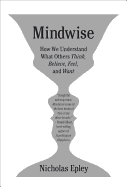Jack Covert Selects - Mindwise
February 14, 2014
Mindwise: How We Understand What Others Think, Believe, Feel, and Want by Nicholas Epley, Alfred A. Knopf, 242 pages, $26. 95, Hardcover, February 2014, ISBN 9780307595911 For most of us, social creatures that we are, our lives are nonstop sequences of human interactions.

Mindwise: How We Understand What Others Think, Believe, Feel, and Want by Nicholas Epley, Alfred A. Knopf, 242 pages, $26.95, Hardcover, February 2014, ISBN 9780307595911
For most of us, social creatures that we are, our lives are nonstop sequences of human interactions. How we behave toward and think about other people informs such a huge part of our overall experience that it should bear closer attention. To that point, consider Mindwise: How We Understand What Others Think, Believe, Feel, and Want, Nicholas Epley’s new book that breaks down the human mind for the layperson. In it, he explains the state of our minds, how well we know our own and others’ minds, and most importantly what we can do in light of these discoveries.
The main goal of this book is to reduce your illusion of insight into the minds of others, both by trying to improve your understanding and by inducing a greater sense of humility about what you know—and what you do not know—about others.
The jumping off point in Mindwise is this: you do not understand people as well as you think you do. Similarly, you do not understand your own mind as well as you think you do. Epley illustrates the latter point with a discussion of the planning fallacy, a tendency of people and groups to underestimate how much time a task will require. Epley cites an anecdote shared by a group of psychologists who asked their honors students how long it would take to complete their honors theses. The students were asked to give a best case and worst case prediction. On average, the best case estimate was 27 days, and the worst case estimate was 49 days. The actual result for these students completing their honors theses was an average of 55 days. Taking how you set your own deadlines into consideration, you can imagine how understanding this one fallacy could save companies a lot of money and angst.
While the majority of Mindwise reads like a wonderland of studies and anecdotes that will entertain and enlighten you on what we can and cannot know about the mind, it does not offer scientific solutions to the problem of the mind’s opacity. There is no sensational magic trick that will let us peer into the minds of our friends and coworkers. In fact, Epley concludes the book with surprisingly practical advice, issuing a call for transparency: make your world one in which we need not hide our thoughts or intentions. With clear, unambiguous solutions like that to the limits of our understanding, Mindwise will help us to change the way we look at and listen to the people around us.


